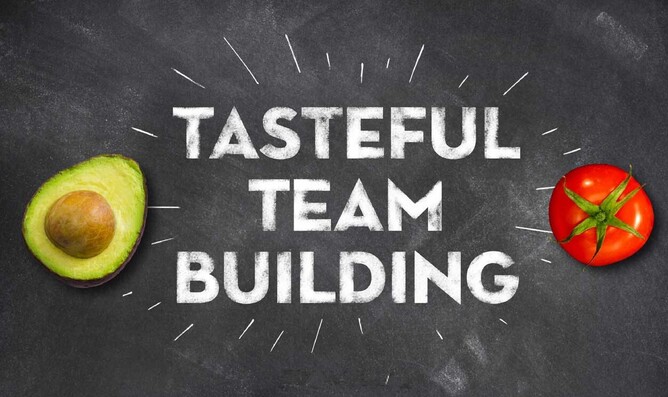It’s all very well for us to talk about the benefits of team building exercises. After all, it’s what we at Social Cooking do for a living! Do team building exercises actually work?
The team at Huddle say:“..even strong teams can benefit from team building exercises. They’re a great way of improving communication, morale, motivation, productivity, helping employees or new teams to get to know each other better, and learning about one's strengths and weaknesses. Team building games and activities can be used by any business, to promote better teamwork in the workplace. As most business owners and managers know, great teamwork is one of the key factors associated with a company's success.”
Learn more about how our team building exercises work, and contact us to see what Social Cooking can do for your team.
Glide Consulting and Sodexo have a few thoughts on why team building exercises are an important part of building a strong corporate culture:
- Increased productivity
- Better communication
- Better collaboration
- Improved staff motivation
- Improved problem solving and creativity
- Breaking down walls
- Bringing remote teams together
1. Increased productivity
Improving productivity is one of the most common goals of team building activities.
The team members learn how to use each other's strengths to work toward a common goal. Once the hidden potential is uncovered, the team members will become more confident in their abilities. These talents will improve motivation and eventually productivity when applied to daily tasks at work, school, or any other institution. (Source: Terrapin Adventures)
2. Better communication
The key benefit of a properly planned team building activity is improved communication between staff. Enjoyable, fun activities enable team members to get to know each other. They also build better understanding and break down walls by encouraging people to focus on what they have in common, rather than their differences.
Communication between team members is also important. According to an MIT study, predicting a team's success comes down to communication.
"With remarkable consistency, the data confirmed that communication indeed plays a critical role in building successful teams. In fact, we've found patterns of communication to be the most important predictor of a team's success."
3. Better collaboration
One of the most important benefits of a properly planned team building exercise is collaboration between staff members. Collaboration is about knowing who knows what, trusting them and being able to reach that person when you need them.
By creating activities that people enjoy and can experience as a group, team members can build relationships. They can also develop contacts outside their day-to-day role that will help them in the future.
4. Improved staff motivation
Team building can help increase staff motivation and nurture a successful company culture. When staff members complete a team building exercise it creates momentum, making them feel good about themselves. It increases team members confidence in their abilities. It also shows staff that the company is willing to invest in them.
Team members who know that their ideas will be taken seriously and that their role in the team matters will be more motivated to produce better work. They'll work harder because they'll be proud to be part of something.
The American Psychological Association reports that team building makes staff members feel valued. Valued team members are motivated.
5. Improved problem solving and creativity
We can get bogged down in our day-to-day routines and become stuck in the usual. Team building puts you in situations that require strategic solutions. These situations will fire creativity and open the doors for new ideas.
Unusual team building tasks give staff members permission to use their imagination to come up with creative solutions. They send the message that creativity in the workplace and bouncing ideas off each other is welcome.
6. Breaking down walls
Often there's a gap between team members, between teams, and between staff members and management. For instance, the customer success team won't support sales because they never mix with those people. Team building increases trust, which will bring people together.
7. Bringing remote teams together
Remote team building has the power to build strong relationships. This will improve productivity, staff retention, engagement and morale. Team building is a great excuse to pull members of teams together who may not always work closely during their day-to-day work life.
Allowing remote teams to build their relationships outside of work can have a huge impact on how well they work together in future. This also allows for isolated team members to feel closer to the wider team, and help improve connection to the business and their peers.




